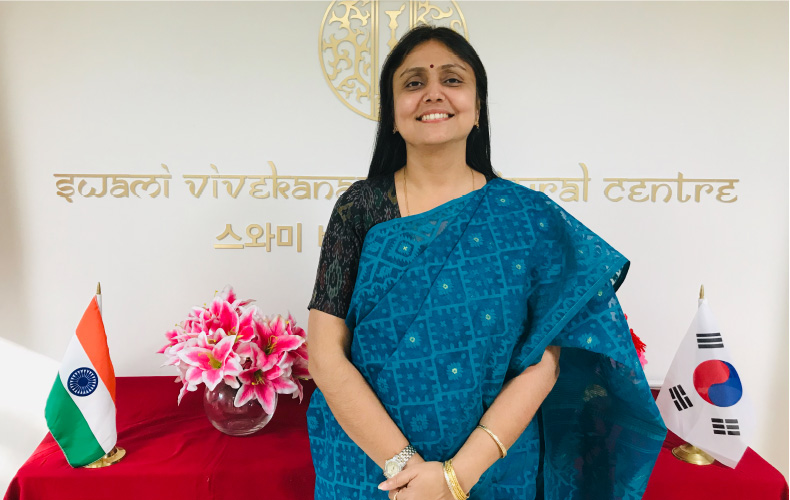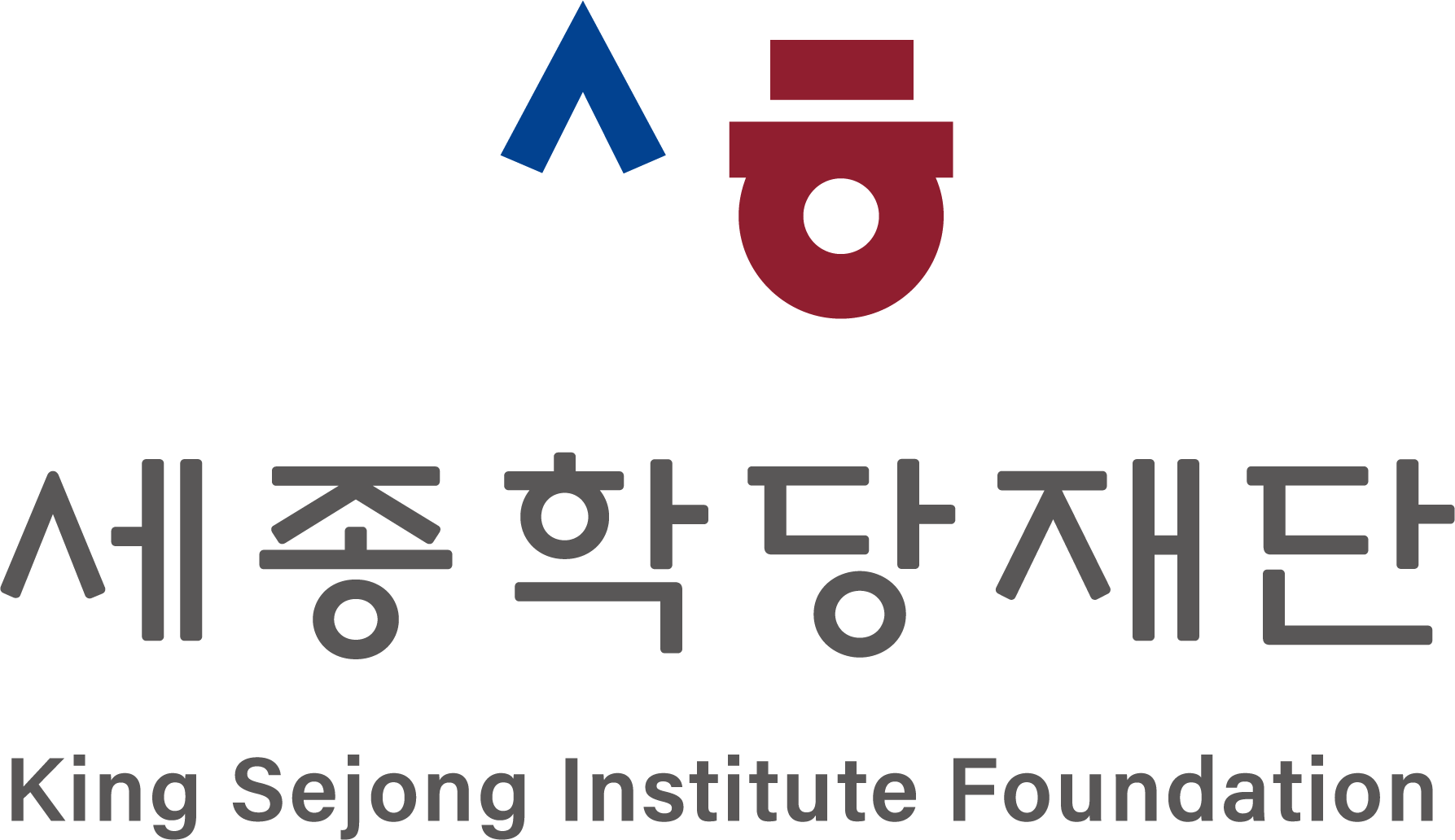
Development of Bilateral Ties Through Korean Language & Culture
Sonu Trivedi, Director of Swami Vivekananda Cultural Centre, Embassy of India, Seoul

▲ Profile of Dr. Sonu Trivedi
She joined as Assistant Professor, Zakir Husain Delhi College, University of Delhi in 2006. Before moving to the diplomatic assignment at Seoul, she was a Fellow at Nehru Memorial Museum and Library, New Delhi. She was also a Visiting Fellow at Institute of Asia Pacific Studies, Chinese Academy of Social Sciences, Beijing (2011), member of Myanmar Core Group at Indian Council of World Affairs (2014) and a Visiting faculty at Indian Institute of Management, Indore (2015-16). She was also the Convenor, Southeast Asia Research Group at Department of Political Science, University of Delhi and Founder Director, Centre for Vietnam Studies, New Delhi. Her book ‘Transition from Authoritarianism to Democracy: Comparative Study of Indonesia and Myanmar’ was published in early 2015 and her latest work on Democratisation in Myanmar: Progress and Prospects was published in 2018. She has also co-edited a book with Shri Shakti Sinha titled ‘Emerging Horizons in India-Vietnam Relations’
Q1. The Republic of Korea and the Republic of India have been pursuing economic and cultural exchanges ever since the establishment of diplomatic ties in 1973. What was people’s perception of Korea in the past in India, and how has it changed?
India and Korea share deep historical and cultural legacy with a common lineage too. Though, the diplomatic ties was established in 1973, but historical and civilisational ties goes back to centuries. From the mythological story of Princess from Ayodhya coming to Korea and her marriage to King Suro to the advent of Buddhism in the country and resonance in the national movement of the two countries in the writings of Rabindranath Tagore, Mahatma Gandhi and Jawaharlal Nehru along with the support in the Korean War in the contemporary history, the people of India and Korea have always shared a close bond for a long period.
India-Republic of Korea (RoK) relations has made great strides in recent years and has become truly multidimensional, spurred by a significant convergence of interests, mutual goodwill and high level exchanges. Bilateral ties between the two countries were raised to the level of 'Strategic Partnership' in January 2010 this included an enhanced focus on political and security cooperation including agreements for an annual security dialogue between the two countries and cooperation in the joint development of defence technologies. There was also recognition of the potential for enhanced cooperation in terms of India’s role as a provider of maritime security in the Indian Ocean region. In course of time, RoK's open market policies and the 'New Southern Policy' found resonance with India's economic liberalization, 'Look East Policy' as well as “Act East Policy”. India sees it as an indispensable partner in its ‘Act-East’ strategy, with the potential to contribute to peace, stability and security in the Indo-Pacific Region.
In recent times, the growing popularity of South Korean culture across the globe has seen its impact in and India too. The K-craze has caught up with millennials all over the country, who has been carried over by Korean music, shows, beauty products, language and food. In the new National Education Policy 2020, recently Indian government has included the Korean language at the secondary level among the foreign languages to be offered to Indian students. Korean language courses are gaining popularity among Indians now. Every year, more than 1,000 students are learning the Korean language. One of the main reasons why students are opting for the Korean language is mainly to enhance job opportunities in Korean companies. Another reason attributed to the growing popularity is because of their great love for K- pop and K-Dramas. These K-brands have a fan base in almost all parts of the country, and the desire to know the dialogues, lyrics and meaning of the songs has driven youngsters to learn the language.
Q2. This July, the Indian government announced that the Korean language has been chosen as one of the foreign languages taught in school. What would you say is the significance of this?
Language is considered as a unifying link between people of any two countries. Choosing Korean as a foreign language to be taught in schools is a welcome move by Government of India. This will help in connecting the hearts and minds of people of the two countries. It will not only solidify the bilateral political ties between India and Republic of Korea, but also help in building bridges and boost people-to-people ties between the two countries.
Q3. Is there a part of Korean culture that you have found particularly special (fascinating, fondness of, etc.), while living in Korea?
Personally, I have been fascinated by the 'Korean Beauty' and the beauty products. The beauty conscious Koreans have also introduced 'beauty' in promoting Korea as a tourist destination and has 'beautified' the concept of introducing the seasons through 'Cherry Blossom' in Spring and 'Fall' of colorful leaves in Autumn, when you get to see the most majestic sceneries the country has to offer.
Q4. Is there a special aspect of Indian culture that you wish to introduce to Koreans?
I wish to introduce Indian films to Koreans. Indian Films resonate with Koreans in a big way, as they are not only high in dance, drama and musical content but the countries have similar cultures as well - reflecting emotions and family values. Some of the commercial hits like Dangal, Bahubali, Three Idiots, Secret Superstars have already been introduced. This year too 8 Indian films have been selected under the Asian Film category to be showcased at 25th Busan International Film Festival. Indian Cultural Centre has also been organising Film Festival as a part of its Annual Cultural Festival of India – SARANG.
Q5. As you may or may not be aware, the King Sejong Institute Foundation is operating the KSI in 7 locations in India: New Delhi (Korean Cultural Center in India), Chennai, Barasat, Patna, Bengaluru, Imphal, and Pune. What do you think is the impact of the dissemination of the Korean language and culture through the KSI on the relations between the two countries?
KSI has been a very active institution in promoting Korean 'soft power' in India. It has opened several branches in different regions of India, which has extended its outreach to various communities which are cut-off from the mainstream. KSIF has established itself throughout the geographical territory of India - North, South, East and West - thereby covering millennials who are already under
the Hallyu wave. This signifies the importance of 'language' as a factor is promoting people-to-people ties between the two countries.
Korean language is getting popular among youths in India. Mostly in metropolitan area, Korean language and culture in popular, however, for reaching up to the masses, it should penetrate at the grass-roots level. Therefore, it is suggested that more regional and local Centres for teaching and learning Korean language must be opened in different States and Union Territories in India.
Q6. Please tell us what you would like the KSI to pursue/focus on in the future and any other words you would like to share.
It is suggested that the study material for learning Korean could be prepared in local and regional languages in India. Opening new Centres at the State level will increase the outreach of the Korean language throughout India and spread it at the local level too.
It may be possible to consider introducing Hindi language in Korean educational system to promote student and cultural exchanges between two countries.













